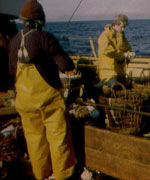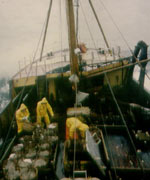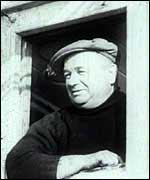|
Danger
Graham Howard went to sea at the
age of 16, following in the footsteps of thousands of Grimsby boys before
him. "I don't really know why I went, " he remembers, "It
was just something that was in you. My dad, brothers and all my mates
were fishermen, and I wanted to be one too."
However, Graham didn't get off to the best of starts.
"The first time I went out it was as a galley
boy, but it wasn't in what was noted as the best ship in Grimsby. We went
straight out into bad April weather. The sea sickness, I'd never felt
anything like it - I wished I was dead!"
"But when we got home I forgot about it and I just
kept on."
 |
| Fisherfolk |
During his fishing career Graham had his fair share of
scrapes, including being washed overboard.
"It was when we were fishing on the North Cape, off
the coast of Iceland," he recalls. "The weather was terrible,
and I was on the nets pulling in the catch when we took a dollop and I
went over."
"The First Mate grabbed the back of my frock (because
in those days we all had to wear rubber frock coats to protect ourselves),
he gave me a clip around the lughole and told me to stop mucking about!"
"I don't know if he really thought I had been but
I nearly lost my life, I was terrified."
Life on board
Graham agrees that a certain amount
of bullying went on on the trawlers. "But it got stamped on straight
away," he stresses, "The elder guys didn't let anybody pick
on younger guys - they just wouldn't allow it."
 |
| On the trawlers |
"If you saw somebody being a little bit bullied,
you cured them one way or another."
He recalls one incident in particular. "When we
were on the northern boats there was this bloke who always forced the
younger ones to run his bath for him."
"I stepped in one day and told the guy to stay where
he was and that I'd take care of it. I added half
a tin of cassocks powder to the water, and he didn't ask anyone to run
his bath again..."
Day to day life though, generally revolved around the
haul. "It was all about expectation - what you were expecting to
see."
"We deck hands used to curse if we got a big haul,
as it robbed us of our sleep. On the other hand we knew if we didn't catch
any fish we wouldn't get any money. It was a Catch 22 situation."
The Skippers
Skippers were notorious for being reckless and risking
the lives of their men, but Graham feels they were justified.
"The risks were calculated. These men knew their
ships. But a Skipper was only as good as his last haul. If he didn't make
anything on the last trip he made, the staff would be onto him. Two
bad trips out and he'd be out of work. We were just supposed to trust
them."
Graham shakes his head and admits
that mistakes did happen. "Trawlers have gone out in really bad weather
and completely iced over. In 1953, 40 men lost their lives off the coast
of Iceland. But that was the job - you knew about risks."
 |
| The skipper |
Graham remembers the sort of conditions
that became a way of life. "Iceland was hell in the winter. We hated
it then. If anything was going to go wrong it would
be in Iceland."
"Any fisherman who tells you he isn't scared of ice
is lying. I was up a mast for 36 hours once chopping
the ice off so the ship wouldn't topple over."
A positive side though, remembers Graham, was the solidarity
between the fishermen themselves. "Despite the rivalry, whenever
a ship was lost, whether from Hull or Grimsby, both towns hurt. We knew
it could have been us just as well as them."
"That's how it worked. You looked after each other
as best you could. If you were ever out of the ship because of illness
and so lost a weeks wage, if you saw your mates landing they'd give you
a 'westerly', which means he'd treat you and you'd do the same if it was
reversed."
It was a tight knit community recalls Graham, "You
knew a fisherman by the way he was dressed, we had our own pubs and life,
we'd talk and no-one knew what we'd be on about!"
Cod Wars
The Cod Wars between Great Britain and Iceland in the
1970s were instrumental in the collapse of the fishing industry, where
thousands of British people lost their jobs, especially from those fishing
towns on the east coast of England and Scotland.
"Those people running our lives didn't have a clue
what was going on" says Graham, "Talk to any fisherman from
Hull or Grimsby and you'll see we had nothing against the Icelanders,
they were like us, just fighting for their living."
"Their fish was like our North Sea oil is to us,
their money, but they were willing to share it with us. They offered us
a good tonnage but it was turned down by the British Government."
Like many fishermen of his generation, Graham blames
the government for the decline of the industry. "They betrayed us"
he says, "and it was a Labour government too! They promised us compensation,
but we haven't seen a penny."
"If I have any regrets about fishing its that those
people are still having to fight for what's rightfully theirs."
Apart from that however, Graham remembers his fishing
days fondly. "I stopped in 1974, but had met some wonderful people
who I still knock about with today. We were all a big family, we knew
what each other went through. "
Family
Life was especially tough for the families back home
though. Graham admits that although he was one of the lucky ones, many
marriages broke up over the long periods of absence.
"I was fortunate," he says, "I married
a fisherman's daughter and she knew what it was like. But lots of marriages
failed because married girls didn't understand the industry- on for three
days and off for three weeks. You couldn't be there for your family.
"Both of our babies died and I wasn't there, the
wife had to deal with it on her own. It's not fair but that's how the
job works."
"It was a very male orientated environment, and
the wives took a bit of a back seat at times. There were never any women
on the trawlers- they were seen as very unlucky. Women weren't allowed
in man's world."
 |
| Cod |
Decline
The collapse of the industry didn't come as a surprise
to Graham. "I knew in 1974, " he explains, " I'd been to
a meeting with Groscoe, this parliamentary guy and I knew then. I said
to my wife 'We've lost it Lil'. "
"But I was lucky. There was this food firm starting
out at one of the local farms and they offered me a job- I went down the
docks and signed off the ships there and then- I knew we'd lost it."
"The blokes clung on for another couple of years.
They'd reached a certain understanding with the Icelanders, but we knew
it was only a matter of time before one or the other would break the rules,
and then the waters would become exclusive."
"It happened within a couple of years. It killed
the town, it took the heart out of us. The whole town was built on fish
and now its gone."
Neither does Graham have high hopes for the future of
cod. "The Icelanders have managed their fisheries and have plenty
of cod. Somebody went wrong and it definitely wasn't the Icelanders."
"Fish will disappear from English waters, that is
to say, the North Sea, entirely," he warns darkly, "North Sea
cod will become a delicacy. It'll be on a par with caviar!"
|

